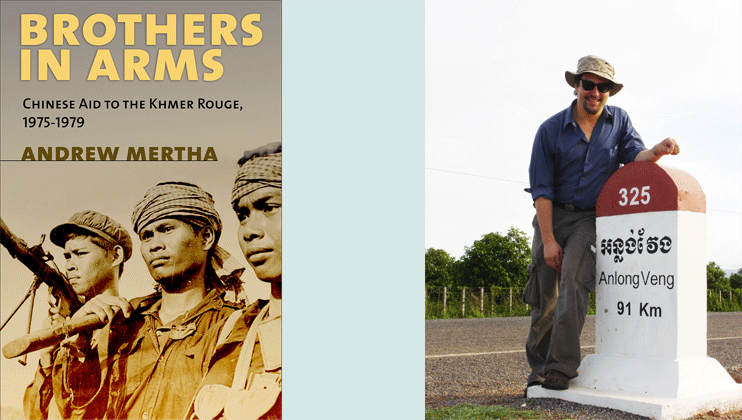Tuesday, April 29, 2014 | 5:30 PM EDT - 5:30 PM EDT
, New York, NY
When the Khmer Rouge came to power in Cambodia in 1975, they inherited a war-ravaged and internationally isolated country. Pol Pot’s government espoused the rhetoric of self-reliance, but Democratic Kampuchea was utterly dependent on Chinese foreign aid and technical assistance to survive. Yet in a markedly asymmetrical relationship between a modernizing, nuclear power and a virtually premodern state, China was largely unable to use its power to influence Cambodian politics or policy. In Brothers in Arms, Andrew Mertha traces this surprising lack of influence to variations between the Chinese and Cambodian institutions that administered military aid, technology transfer, and international trade.
Today, China’s extensive engagement with the developing world suggests an inexorably rising China in the process of securing a degree of economic and political dominance that was unthinkable even a decade ago. Yet, China’s experience with its first-ever client state suggests that the effectiveness of Chinese foreign aid, and influence that comes with it, is only as good as the institutions that manage the relationship. By focusing on the links between China and Democratic Kampuchea, Mertha peers into the “black box” of Chinese foreign aid to illustrate how domestic institutional fragmentation limits Beijing’s ability to influence the countries that accept its assistance.
Andrew Mertha discussed China-Kampuchean relations from 1975 to 1979 as well as contemporary China-Cambodia relations at a National Committee program in New York City on April 29, 2014.
Bio:
Andrew Mertha is associate professor of government, specializing in Chinese and Cambodian politics, particularly on political institutions, the policy process, and the exercise of power.
He is a core faculty member in the Cornell East Asia Program and the Cornell Southeast Asia Program. He is also the Director of the China and Asia Pacific Studies Program.
Mertha’s Ph.D. (2001) is from the University of Michigan, Ann Arbor. Mertha has written three books, The Politics of Piracy: Intellectual Property in Contemporary China (Cornell University Press, 2005), China’s Water Warriors: Citizen Action and Policy Change (Cornell University Press, 2008), and Brothers in Arms: Chinese Aid to the Khmer Rouge, 1975-1979 (Cornell University Press, 2014).
He has articles appearing in The China Quarterly, Comparative Politics, International Organization, and Orbis. He has also contributed chapters to the following edited volumes: Engaging the Law in China: State, Society and Possibilities for Justice (edited by Neil Diamant, Stanley Lubman, and Kevin O’Brien, Stanford University Press, 2005); China’s Foreign Trade Policy: the New Constituencies (edited by Ka Zeng, Routledge, 2007); and State and Society in 21st Century China, 2nd Edition (edited by Peter Gries and Stanley Rosen, Routledge, 2010).
Mertha has provided public testimony for the US-China Economic and Security Review Commission, briefed the Congressional-Executive Commission on China, and has accompanied a US congressional staff delegation to Beijing, Xinjiang, and Shanghai to discuss issues of terrorism and narcotics trafficking. He has appeared on National Public Radio, the British Broadcasting Corporation, and Voice of America. Mertha’s comments have appeared in The International Herald Tribune, The Wall Street Journal, The Associated Press, The Los Angeles Times, BusinessWeek, and The San Francisco Chronicle.
Mertha is on the Editorial Committee for the Journal of Comparative Politics, The China Quarterly, Comparative Political Studies, and Cornell University Press, and is on the Board of Directors for the Center for Khmer Studies.
He is a member of the American Political Science Association, the Association for Asian Studies, and the National Committee on US-China Relations.
Mertha has lived in China for seven years as an English teacher (1988-1989), a representative for a toy company (1991-1994, 1995, and 1996), and as a scholar (1998-present); and has conducted archival and field research in Cambodia beginning in 2009.
Mertha grew up on the Upper West Side of New York City, and has resided in Beijing, Shanghai, Chengdu, Chongqing, and Hong Kong. He currently lives in Ithaca, NY.
Politics & Foreign Relations
Politics & Foreign Relations
Recorded 4/28/2014
